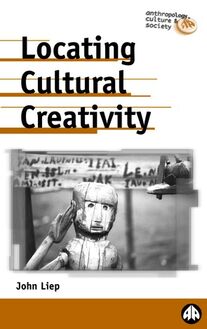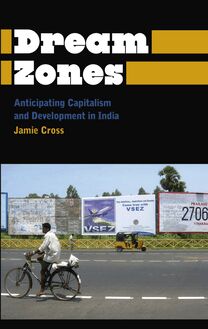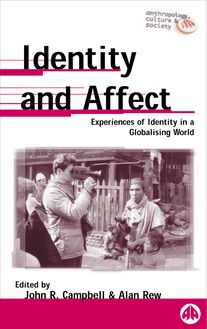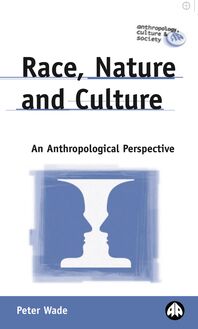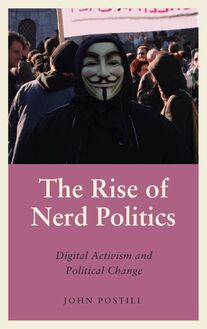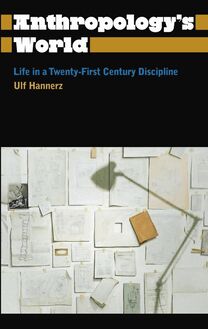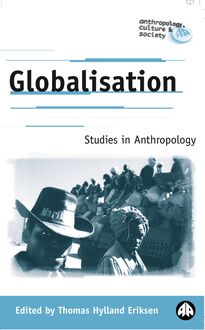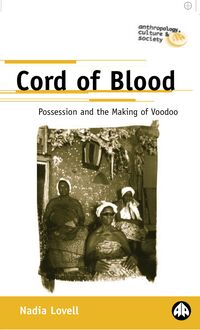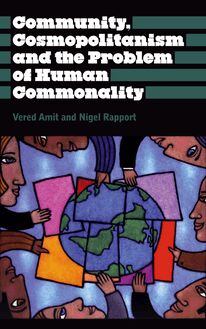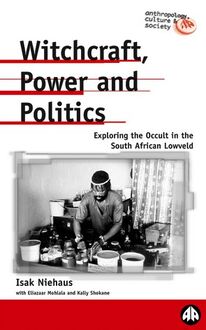Anthropology of the Self , livre ebook
145
pages
English
Ebooks
1994
Vous pourrez modifier la taille du texte de cet ouvrage
Obtenez un accès à la bibliothèque pour le consulter en ligne En savoir plus
Découvre YouScribe en t'inscrivant gratuitement
Découvre YouScribe en t'inscrivant gratuitement
145
pages
English
Ebooks
1994
Vous pourrez modifier la taille du texte de cet ouvrage
Obtenez un accès à la bibliothèque pour le consulter en ligne En savoir plus
Publié par
Date de parution
20 septembre 1994
Nombre de lectures
4
EAN13
9781783715244
Langue
English
In this wide-ranging text Morris explores the origins, doctrines and conceptions of the self in Western, Asian and African societies passing though Greek philosophy, Buddhism, Hinduism, Confuscism, Tao and African philosophy and ending with contemporary feminism.
Scholarly and written in a lucid style, free of jargon, this work is written from an anthropological perspective with an interdisciplinary approach. Morris emphasises the varying conceptions of the self found cross-culturally and contrasts these with the conceptions found in the Western intellectual traditions.
1. Introduction
2. Greek Philosophy and Concepts of the Psyche
3. Buddhism and the Doctrine of the No-Soul (Anatta)
4. The Hindu Conception of the Self
5. Taoism, Confucianism and the Chinese Self
6. African Philosophy and Conceptions of the Self
7. People as Social Beings: Conceptions of the Self in Oceania
8. Feminist Philosophy and the Theory of the Self
Publié par
Date de parution
20 septembre 1994
Nombre de lectures
4
EAN13
9781783715244
Langue
English
ANTHROPOLOGY OF THE SELF
Anthropology, Culture and Society
Series Editors: Professor Thomas Hylland Eriksen, University of Oslo Dr Jon P. Mitchell, University of Sussex
Land, Law and Environment: Mythical Land, Legal Boundaries
Edited by A LLEN A BRAMSON AND D IMITRIOS T HEODOSSOPOULOS
The Trouble with Community: Anthropological Reflections on Movement, Identity and Collectivity
V ERED A MIT AND N IGEL R APPORT
Anthropology and the Will to Meaning: A Postcolonial Critique
V ASSOS A RGYROU
Risk Revisited
Edited by P AT C APLAN
Macedonia: The Politics of Identity and Difference
Edited by J ANE K. C OWAN
Ethnicity and Nationalism: Anthropological Perspectives
T HOMAS H YLLAND E RIKSEN
Globalisation: Studies in Anthropology
T HOMAS H YLLAND E RIKSEN
A History of Anthropology
T HOMAS H YLLAND E RIKSEN AND F INN S IVERT N IELSEN
Small Places, Large Issues: An Introduction to Social and Cultural Anthropology
T HOMAS H YLLAND E RIKSEN
What is Anthropology?
T HOMAS H YLLAND E RIKSEN
Anthropology, Development and the Post-modern Challenge
K ATY G ARDNER AND D AVID L EWIS
Power and its Disguises: Anthropological Perspectives on Power
J OHN G LEDHILL
Control and Subversion: Gender Relations in Tajikistan
C OLETTE H ARRIS
Youth and the State in Hungary: Capitalism, Communism and Class
L ÁSZLÓ K ÜRTI
Cord of Blood: Possession and the Making of Voodoo
N ADIA L OVELL
Cultivating Development: An Ethnography of Aid Policy and Practice
D AVID M OSSE
Ethnography and Prostitution in Peru
L ORRAINE N ENCEL
Witchcraft, Power and Politics: Exploring the Occult in the South African Lowveld
I SAK A. N IEHAUS with E LIAZAAR M OHLALA AND K ALLY S HOKANE
Power Community and the State: The Political Anthropology of Organisation in Mexico
M ONIQUE N UIJTEN
Social Mobility in Kerala: Modernity and Identity in Conflict
F ILIPPO O SELLA AND C AROLINE O SELLA
Negotiating Local Knowledge: Power and Identity in Development
Edited by
J OHAN P OTTIER , A LAN B ICKER AND P AUL S ILLITOE
Class, Nation and Identity: The Anthropology of Political Movements
J EFF P RATT
Ethnic Distinctions. Local Meanings: Negotiating Cultural Identities in China
M ARY R ACK
The Cultural Politics of Markets: Economic Liberalization and Social Change in Nepal
K ATHERINE N EILSON R ANKIN
Bearing Witness: Women and the Truth and Reconciliation Commission in South Africa
F IONA C. R OSS
Landscape Memory and History: Anthropological Perspectives
Edited by
P AMELA J. S TEWART AND A NDREW S TRATHERN
ANTHROPOLOGY OF THE SELF
The Individual in Cultural Perspective
Brian Morris
First published 1994 by Pluto Press
345 Archway Road, London N6 5AA
www.plutobooks.com
Copyright © Brian Morris 1994
The right of Brian Morris to be identified as the author of this work has been asserted by him in accordance with the Copyright, Designs and Patents Act 1988.
British Library Cataloguing in Publication Data
A catalogue record for this book is available from the British Library
Library of Congress Cataloging in Publication Data
Applied for
ISBN 9780745308579 hardback
ISBN 0745308570 hardback
ISBN 9780745308586 paperback
ISBN 0745308589 paperback
ISBN 9781783715244 ePub
ISBN 9781783715251 Mobi
Printed on Demand by Antony Rowe Ltd
Contents
Preface
1 .
Introduction
2 .
Greek Philosophy and Concepts of the Psyche
3 .
Buddhism and the Doctrine of No Soul ( Anatta )
4 .
The Hindu Conception of the Self
5 .
Taoism, Confucianism and the Chinese Self
6 .
African Philosophy and Conceptions of the Person
7 .
People as Social Beings: Conceptions of the Person in Oceania and Melanesia
8 .
Feminist Philosophy and the Theory of the Self
9 .
Conclusions
Bibliography
Index
For Pat Caplan, My foremost critic.
Preface
To measure the importance of things by one’s own turnip patch is not a good method.
Jean-Henri Fabre, Souvenirs Entomologies
In his classic essay on Tolstoy, ‘The Hedgehog and the Fox’, Isaiah Berlin suggested that there were two kinds of scholars. The first kind, the foxes, know many things, in contrast to the hedgehogs who know ‘one big thing’. The fox category includes such scholars as Aristotle and Goethe, while among the hedgehogs Berlin lists Plato, Hegel and Nietzsche. I am definitely, like Aristotle, a fox. I am also akin to Aristotle in other ways – though I make no claim to his intellectual stature! I had no more success with his Metaphysics than did Ibn Sina a thousand years ago. Among his contemporaries Aristotle was disparagingly described as a jackdaw, as he was such an indefatigable collector of facts. I, too, am an intellectual jackdaw. I pass much of my days enthusiastically gathering fragments of knowledge, in the same way as I forage for mushrooms in the woods. In a curious way I find poetry in facts, in all kinds of facts, from the habits of field mice to Hegel’s ontology. I am, then, essentially a natural historian, in both heart and mind, even though this species of scholar seems to have become extinct in the nineteenth century. My intellectual tendencies and aspirations thus tend to be fundamentally realist and historical. That’s why my favourite authors are all oriented towards history and biology – Goethe, Darwin, Kropotkin, Dubos, Mayr, Jonas and Bookchin.
When famous scholars talk about the emotions or sex or the human subject as simply a cultural or ideological construct, or suggest that there is nothing beyond the text, or that language marks the limits of our world, or that the Gulf War had no reality – I have to admit that I feel both confused and perplexed. Are such theories, I ask myself, just old-fashioned idealism dressed up in modern garb? Or am I simply too dim to grasp what underlies the profundity of these propositions. At times, as I have often said to my friends, I feel like the lad in the Hans Christian Andersen fairy tale confronted with the emperor. As everyone is casting admiring eyes on Wittgenstein or Baudrillard or Derrida, and applauding their profound insights, I often wonder whether their obscurantist style is just a way of covering up their nakedness?
Such feelings have not been allayed by the reflections of some colleagues on my own earlier writings. I have been accused of being cranky, pompous and sarcastic, and that in my criticisms I tend to misrepresent the work of the scholars whom I discuss. None of this has ever been my intention. Perhaps my criticisms of such scholars as Mary Douglas and Edward Wilson do read rather harshly and I may perhaps have misunderstood them, or failed to capture the full complexity of their work. But my critiques only represent my own critical reflections on their work, and were in no sense meant to be either cantankerous or dismissive. In fact, I have nothing but admiration for these two scholars, and think their work has been truly pioneering. In this study none of my criticisms must therefore be interpreted as ‘attacks’ on my colleagues or intellectual forebears.
This present work represents my intellectual ramblings – Aristotle-like – through some of the anthropological literature on conceptions of the person. It aims to be a critical guide to this literature. The writing of such a study is fraught with difficulties. Firstly, this domain of anthropology is, as Tim Ingold suggested to me, a philosophical and conceptual ‘minefield’, and judging by the anger expressed by one anonymous referee, it is one that evokes strong emotions. Secondly, in attempting to bridge the divide between academic scholarship and a lay readership one seriously risks falling between two stools. On the one hand, as an introductory text, it is open to the charge of being too erudite or advanced for the ordinary reader, and as containing ideas that should have been developed elsewhere in academic journals, solely for the benefit of academic specialists. On the other hand, those who dwell in the narrow halls of academia may bemoan the fact that in its broad coverage and in its inter-disciplinary style it is apt to border on ‘superficiality’. I have no doubt, for example, that some Vedantist scholar who has pored over Sankara’s writings, in Sanskrit, for the past thirty years may think that to describe maya in terms of illusion, as Mircea Eliade and I myself have done, is somewhat simplistic, if not misleading. But given my rambling style, and the attempt to cover Sankara in some three pages, it could hardly be otherwise.
This study, therefore, is intended as a kind of guidebook or companion that an interested student or person may take along when they explore the by-ways of psychological anthropology, in the same way as one takes a field-guide when going on a mushroom foray. I have tried in a sympathetic manner to introduce the reader to interesting ethnographic data and ideas within a particular sub-field of anthropology, focusing on cultural conceptions of the person. I offer some critical reflections on the work of various scholars, although my approach is descriptive and expository rather than critical or analytic, but as I have said, none of these criticisms is meant to be dismissive or derogatory. I have little but disdain for the elitist and competitive ethos that permeates contemporary culture and is actively propagated by the present political establishment.
There is a saying that fools rush in where angels fear to tread. Perhaps I am a little foolhardy in this study in attempting to present a comparative account of cultural conceptions of the person that is both critical and introductory, and in trying to act as a guide in presenting for a wider audience ethnographic material and scholarly debates around this important topic. But I hope that my little compendium will prove interesting and illuminating, and that real scholars will forgive me for its shortcomings.
The book, in a sense, is a sequel to my Western Conceptions of the Individual , which explored conceptions of
